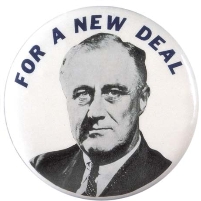Conservatives Wrong about New Deal: David Sirota

In response to conservative economists’ claims that FDR’s New Deal actually prolonged the Great Depression, two-time New York Times bestselling political commentator David Sirota reviewed detailed unemployment data (PDF) from the U.S. census to disprove these claims and found that “the pre-WWII New Deal era from 1933-1940 - even including the much-hyped recession of 1937-38 - saw the single biggest drop in the unemployment rate in American history… I discovered that the right bases its New Deal revisionism on the short-lived recession in a year straddling 1937 and 1938. But that was four years into Roosevelt's term—four years marked by spectacular economic growth. Additionally, the fleeting decline happened not because of the New Deal’s spending programs, but because Roosevelt momentarily listened to conservatives and backed off them.” Conservatives, maligning the efficacy of the New Deal in order to dispute the potential value of Barack Obama’s proposed $700 billion stimulus, have relied on Amity Shlaes’ book The Forgotten Man, the seminal work of the anti-New Deal camp. However, as University of California historian Eric Rauchway points out, Shlaes “has unemployment at 20 percent in the 1937-38 recession. That's appalling—almost as bad as 23 percent in 1932. Based on such a statistic, you could think the New Deal wasn't alleviating the Great Depression. But that number hides something: A third of the people Shlaes counts as unemployed had a job that the New Deal gave them through its relief programs.” Although WWII did kick-start the economy, Sirota shows that unemployment dropped 9% from 1932-1940, and only 8.7% from 1941-1944.
- Top Stories
- Unusual News
- Where is the Money Going?
- Controversies
- U.S. and the World
- Appointments and Resignations
- Latest News
- Trump to Stop Deportations If…
- Trump Denounces World Series
- What If China Invaded the United States?
- Donald Trump Has a Mental Health Problem and It Has a Name
- Trump Goes on Renaming Frenzy






Comments